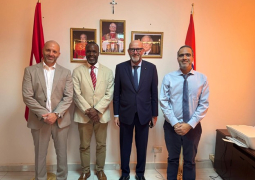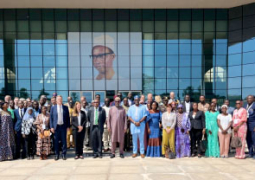
The tree-cutting exercise carried out by NAWEC, has drawn public outrage and deep disappointment from TAF CEO Mustapha Njie, who described the incident as “heartbreaking.” The company’s pledge to plant five to 10 trees per compound was more than a policy, it was a promise to future generations.
With the damage now done, TAF is doubling down on its environmental mission through the newly launched TAF Green Initiative, aiming to restore what was lost and plant 10 million trees across Africa, something the company is working towards achieving.
“Words cannot fully express the profound sadness and disappointment I felt, and continue to feel. This act stands in stark contradiction to the very conversations our leaders are having. It is a microcosm of the broader environmental challenge we face,” said Mustapha Njie, CEO of TAF Africa Global.
He continued: “This must stop. For this reason, TAF Africa Global is committing to go beyond construction and into direct, advanced advocacy to prevent such acts, not only in The Gambia, but in every country where we operate.”
Speaking on the environmental impact, Mr Njie added: “The consequences of cutting down trees are devastating. It accelerates climate change. Trees are the lungs of our planet, they absorb and store carbon dioxide, the primary greenhouse gas. When we cut them down, we release this stored carbon back into the atmosphere and eliminate a vital tool for carbon sequestration.”
“The trees in Brufut Gardens are gone. We cannot bring them back. But we can honour their memory by ensuring that no other tree falls without a fight. Let us choose a greener, more sustainable path. Let us build our cities, but let us build them in harmony with nature.”
Buba Badjie, Communications Officer for NAWEC, acknowledged the incident and described it as a failure in communication. He spoke at length about the importance of environmental protection and the need to safeguard trees.
“From the Managing Director of NAWEC to the very last staff member, we all feel the weight of what happened. It is deeply unfortunate. We have plans moving forward to ensure the protection of our environment. The intention behind the action was safety, but the way it was carried out was wrong. This is not about defending the act, it’s about acknowledging the truth. The manner in which the trees were cut should never have happened.”
“Had we contacted TAF and explained that we needed to cut trees below 50 centimetres, we are confident they would have supported us. Unfortunately, the staff acted beyond their instructions. However, as an institution, we take full responsibility and are committed to working with TAF to ensure this never happens again, not just with TAF, but anywhere in the country.”
“It is not NAWEC’s culture to cut down trees. Our standard practice is tree trimming, not removal,” he concluded.
When asked whether TAF Africa Global would pursue legal action over the recent tree-cutting incident, CEO Mustapha Njie responded candidly: “Not everything is resolved in court. I have land-related cases that have been in court for nearly ten years. The land remains unused, and neither myself nor the individual who took me to court is benefiting,” he said.
“I believe in resolving matters through dialogue, and I think this is something the younger generation should learn from. Yes, I felt deeply saddened when I heard about the incident, but I also understood that it stemmed from a breakdown in communication.”
Visit to TAF City in Gunjur
Following the press conference, TAF officials led journalists on a guided tour of the TAF City in Gunjur, offering a glimpse into the lush greenery and visionary planning behind TAF City. Officials described the development as “futuristic,” highlighting its commitment to sustainability and innovation.
CEO Njie shared his broader ambition: “By the time TAF City is complete, it will be larger than the entire city of Banjul. This is part of a vision to develop one million affordable homes across the continent. But most importantly, I am a Gambian, and I want to begin this journey right here in The Gambia.”
During the visit, journalists witnessed firsthand the verdant landscape of TAF City, a testament to the company’s pledge to plant five to 10 trees in every compound it builds. “But the vision goes beyond greenery. TAF City is designed with safety and community wellbeing at its core. Entry into residential zones is secured through a digital access code system, ensuring that residents feel protected and at peace.”
TAF officials emphasised that this approach reflects their mission: to build not just homes, but thriving, secure, and environmentally conscious communities.
Read Other Articles In Headlines




